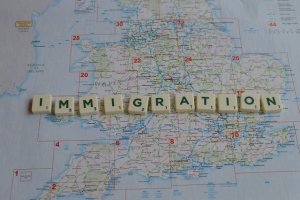Support migrant centric journalism today and donate

 • Watch This Video
• Watch This VideoAccording to official UK government estimates, approximately 1,500 migrants arrived to live in the UK every day during 2005. The same figures suggest that 185,000 more people immigrated into the UK than emigrated to another country, yielding a net population gain of 500 per day.
The total for those arriving was lower than 2004's record, but continues a trend of high levels of migration.
While the number arriving from Eastern Europea grew, the numbers of people leaving the UK has also risen.
In total, 565,000 people arrived in the UK in 2005 saying they intended to stay for at least a year. At the same time, 380,000 people left. More than half of the 1,000 people a day who left the UK were British citizens.
However, after taking into account those who left the UK, the net inflow of people was 17,000 lower than 2004's record figures.
According to the figures released by the Office for National Statistics, the largest single group of immigrants were 121,000 arrivals from "new commonwealth" nations - principally, Pakistan, Bangladesh, India and Sri Lanka.
However, in late August the government also released a major statistics data set that indicates approximately 1.5 million people had come into the United Kingdom in the previous two years.
Specifically, just about 1,425,000 people from all countries entered the UK since the EU-25 expansion of May, 2004.
Some of the most striking figures relate to the eight Eastern European nations that joined the European Union in 2004. 80,000 people officially came from the so-called Accession Eight countries for at least a year in 2005, up more than 50% again from the 52,000 of the second half of 2004.
Of the 1.42 million total number of immigrants who arrived in the UK since May 2004, 427,000 were people registering to work from the eight former Eastern Bloc countries which joined the EU in 2004, with the vast majority coming from Poland.
Add to that the number of self-employed people from those countries - and here we have to take a Home Office minister's estimate rather than official figures - then the total from the eight former Eastern Bloc states reaches "about 600,000".
There are no figures for the number of children or spouses accompanying the self-employed, but we do know that the 427,000 registered workers brought with them 36,000 dependants.
That brings the total of people given the right to live and/or work in the UK from the new EU member countries to 636,000 since May 2004.
While this may seem at complete odds with the latest figures, the 600,000 total represents all those arriving to work for any length of time in the UK, rather than just those saying they intend to come for a year.
The ONS figures suggest that approximately 80,000 people a year are coming from Eastern Europe to live long-term in the UK.
The overwhelming majority were Polish with an estimated 49,000 Poles coming to live in the UK for at least a year in 2005 - three times the number in 2004.
The majority of Eastern Europeans came to work rather than for other reasons, such as to join a British spouse or to study, according to the analysis.
Of those who left the UK, some 198,000 were British citizens. Asked where they were heading for, a fifth had chosen Australia, followed by other groups going to live in Spain and France.
Of the other groups that left, 56,000 were from other parts of the European Union, 40,000 from "old Commonwealth" nations such as Australia and New Zealand, 24,000 from new Commonwealth nations and 62,000 from other places.
The figures are based on surveys of people arriving or leaving at airports. While the method has been criticised in the past for lacking in accuracy, it is the only way the UK currently counts movements of people.
Related:• Immigrants help the UK economy grow by 3 percent
• UK Tory leader: immigration is good for Britain
• Migrant workers in the UK have brought many benefits
• UK Home Office announces illegal immigration crackdown
• Surge of foreign workers raises UK migration debate
• Immigrants push up housing demand in UK





















